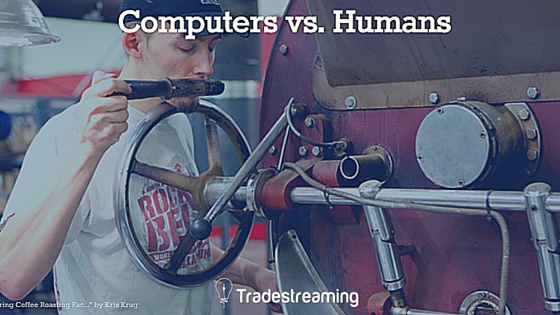
We’ve entered an era in investing where we read daily about billionaire stock pickers who’ve built large fortunes off their uncanny ability to invest in winners. There’s an entire cottage industry of websites that track all the investment moves of large fund managers in the hope for gleaning the next big homerun investment. Books like John Reese’s Guru Investor have deconstructed the strategies these top investors use so that investors at home can play along.
Here’s Estimize’s founder, Leigh Drogen on the humanness of great investing:
But here’s where it gets interesting. The best humans are still leaps and bounds better at investing than the best computers and the quantitative analysts behind their algorithms. Why? Because we’re just starting to scratch the surface of artificial intelligence in investing, and algorithms are still relatively dumb and inflexible. The best humans are still incredible at pattern matching and adjusting when correlations fall apart. Call it intuition, call it whatever you want, humans still have something extra that computers don’t (for now).
There is still something innately human about being able to identify and manage a great investment. No matter how good computers are at this point, they can’t recreate that special something.
On the other hand, much of today’s investing is happening via algorithms, via machines programmed to do what humans can’t — stick to an investment strategy. Trading volume in certain markets, like government bonds, is estimated to be 90% comprised of algorithms. That means buying and selling is happening machine-to-machine.
Machines can do something that behavioral finance experts know that humans just aren’t built to do: turn off their emotions and stick to a strategy. Algorithmic platforms enable quick filtering of investment candidates against standardized investment criteria and removes extraneous pressures and can make quantitative sense of conflicting signals.
So, which is it? Experts tend to say it’s a little bit of both. It’s the confluence of machines and humans that makes for the best, most successful investing. It’s the computer-enabled research and strategy building that enables a human, in spite of all his or her biases, to pull the trigger, when and where he or she determines is most appropriate.
According to Matthew Klein, the founder and CEO of Collective2, a platform for humans to devise, test, and manage algorithmic trading strategies, new investors should stick to the type of investing that plays to our strengths:
So if I were asked to give advice to some young hot-shot kid MBA at Harvard wondering what kind of investing field to pursue, I would say: Focus on the stuff that requires physical carbon. Do stuff that requires that you stand up at a podium and deliver a speech. Be a short-seller like Andrew Left who can scare the bejeesus out of investors by emailing a really cheesy PDF file to people in your rolodex.
To explore this concept further, Tradestreaming recently invited machine-human investing experts Matthew Klein, CEO of Collective2 and Leigh Drogen, CEO of Estimize to a frank conversation on the relative merits of algorithmic investing and stock picking.
View Can A Computer Do It Better? on Dealbreaker.


